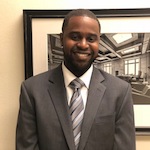
Theodore Thomas (JD ’09) is an assistant public defender for the Law Office of the Cook County Public Defender. He studied finance at the University of Illinois Urbana-Champaign as an undergraduate but still pursued his interest in criminal law. He participated in a summer program in Chicago that gave him insight and hands-on experience in legal writing and civil and criminal law proceedings.
Thomas recently discussed his time as a law student and his continued involvement with the DePaul Law Mock Trial Team.
Some responses have been edited for clarity and length.
Q: Why did you choose to attend DePaul College of Law?
I think there were a couple of factors that led me to DePaul. The first one was, I had a really close friend growing up and her mother went to DePaul College of Law. I think I was aware of DePaul in the back of my mind because she was an alum…I also always wanted to come to Chicago, and in my mind, I wanted to practice in the criminal landscape, criminal law. I knew Chicago was one of the largest markets for that in the country, and so I wanted to pick a Chicago school. DePaul was the best fit for me.
Q: While you were at DePaul, were you focused on criminal law or did you explore other areas as well?
I think for the most part I stuck to the criminal landscape. Obviously, you take all the courses that everyone else takes, but during my time there it was mostly, especially after my first year, criminal-related. It was really getting my mind set to be ready for a career in litigation.
Q: Was there anything that sticks out from your time at DePaul that really helped you in your career?
Absolutely. In my first-year criminal law class, the professor, L. Song Richardson, pulled me aside one day and I guess based on the discussions we were having, basically said, “I think you have a knack for criminal defense.” Honestly, when I went to law school I wasn’t exactly sure whether I would be prosecution or defense. I tend to be more defense leaning, but I didn’t know. Professor Richardson made some calls because she had some connections here at the public defender’s office. Right from then, after the call, that basically set me up with an internship here. I guess you could say the rest is history because I clerked here the summer after 1L, and then I clerked every semester until I graduated and eventually got hired.
Q: What would you consider your top accomplishments of your career?
One of my major professional accomplishments is that I teach Trial Advocacy at the DePaul College of Law in the spring, and I also am one of the head coaches of the trial team at DePaul. I think one of my major accomplishments was we were able to win the school’s first trial team national championship in school history. That was a fairly big accomplishment.
In the office, I have been able to, since I was hired in 2010, litigate well over 60 jury trials to verdict in that time. Those trials included narcotics, weapons offenses, sexual assaults, violent crimes (armed robberies, kidnappings, vehicular hijackings and attempt murders) and first-degree murder cases. Doing so many has allowed me to work my way to the current position I’m in now, which is with the Homicide Task Force within the public defender’s office.
Q: With working with the trial team, do they pick your brain about what it’s like to work in the public defender’s office?
All the time. I have a large variety of students so I have some that want to be prosecutors, I have students that want to be private attorneys, I have students who want to be public defenders, and some of my students currently clerk in our office right now. I really enjoy my mentorship role because I was in that role asking, “What do we do with this, and how do we do that?” It’s nice to give back. Since I’m not too far removed yet, I think I can share with some of my students my experiences, and I think it’s still relatable to the current crop of students. I think it’s really valuable, at least for me it was, getting that sort of experience beforehand so you can know what to expect and how to navigate down the road.
Q: How would you describe the alumni network?
My alumni networking, or how I reach out to alumni, comes from my trial team work. I started teaching trial team back in the Fall 2009-Spring 2010 school year, and I have students even from my first trial team reach out to me and ask what’s going on with the new crop of students and how are they doing. I invite many of my former students to come back because they practice many different areas of law. Sometimes they’ll scrimmage the students, but they also provide their perspective. I have alumni speak with students about employment law or what transaction law is or contract law, just to give the students a variety of views. I want to give my students a well-rounded approach as to what can happen [in law].